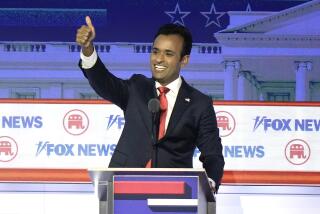COLUMN LEFT : Something Better Than the Usual Lies : Herewith, some questions that might force candidates to reveal actual policies and beliefs.
- Share via
In the course of this presidential year we’ll learn a great deal of trivia about those who would hope to lead us. So before we are subjected to a bunch of lies about how the candidates like to drink milk and read Plato’s “Republic” for relaxation, let’s figure out what we really want to know from them. What are the big questions for 1992, and do the candidates have any answers?
Here’s my preview of killer questions for the 1992 presidential race--a list meant to inspire everyone to come up with their own.
-- The first question was inspired by the work of the economist Michael Porter. Most people agree that the private sector is the primary engine of growth in the American economy and that there are limits to the ability of the government to drive the economy upward. What should the federal government be doing to encourage economic growth, and what is the federal government currently doing that it should not be doing because it may interfere, unintentionally, with economic growth?
Be prepared for lengthy answers to the first part of this question, but press for an answer to the second part. No one ever talks about what the government shouldn’t be doing, except for Republicans who like to complain about government interference (but not about the vast array of corporate welfare benefits that help their friends).
-- From Robert Shapiro, an economist at the Progressive Policy Institute: Should the federal deficit be reduced by cutting spending or raising taxes or both? And, what in the federal budget would you cut and whose taxes would you raise?
If the candidate says he’d raise “rich people’s taxes,” find out exactly who he considers rich.
-- From Newsday editor Jim Klurfeld: With the Cold War at an end and no clearly identifiable enemy left in the world, what is the role of force in American foreign policy?
Candidates typically try to avoid hypothetical questions, so you may want to ask this: Since many weapons systems take 20 years from initiation to operation, name one weapons system that you would undertake to develop in order to prepare America for the threats we may face in the next century.
-- Question No. 4 was inspired by an article by Nicholas Eberstadt at the Harvard Center for Population: One of America’s most pressing health problems is our high rate of infant mortality. The most frequently cited cause is the absence of national health insurance. Yet cigarette smoking turns out to be far more important than poverty as a predictor of which babies will have low birth weight, because mothers who smoke are more than three times as likely as mothers who don’t smoke to have at-risk babies. What is responsible for the poor health of American citizens--the absence of national health insurance or the things we do to ourselves?
Or, to put it another way, is it fair to say that changes in behavior--from smoking, in the case of infant mortality, to carrying guns and taking drugs in the case of other abysmal health statistics--may be as important to improving our nation’s health as figuring out how to make sure that everyone’s medical bills are paid?
-- From New York magazine columnist Joe Klein, inspired by the work of Sen. Daniel Patrick Moynihan (D-N.Y.), who in 1965 warned us that the connection between welfare and the workplace was breaking up. “Earlier,” Moynihan wrote in a recent retrospective, “when unemployment had dropped, new welfare cases dropped. No longer. Seemingly, dependency was an independent variable, possibly out of control.” Twenty-seven years later, welfare dependency, a new social condition characterized by a social behavior and an inability to take part in the broader economy (even when it is growing) is a fact of life in many places in America. How would you reform the welfare system to end dependency and bring more people into the mainstream economy?
-- And last but not least: Who should decide whether or not a woman should have an abortion, the woman or the government?
Caution: the first five questions require fairly complex answers; the last one doesn’t.
More to Read
Get the L.A. Times Politics newsletter
Deeply reported insights into legislation, politics and policy from Sacramento, Washington and beyond. In your inbox twice per week.
You may occasionally receive promotional content from the Los Angeles Times.










